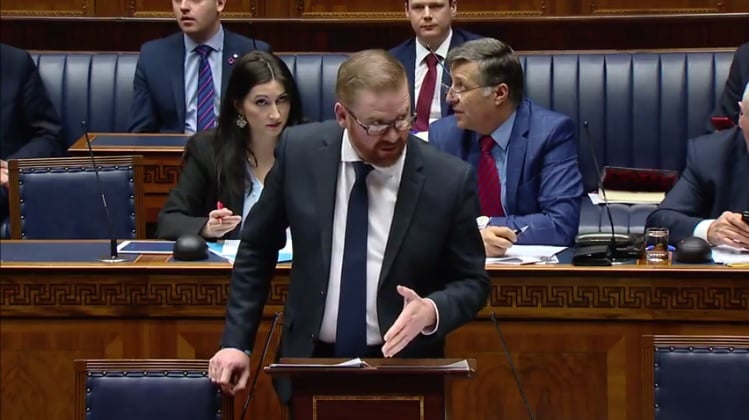Tariffs under Northern Ireland’s Renewable Heat Incentive (RHI) would be retrospectively altered to reduce payments to fall in line with the tiered system implemented in November 2015 under plans put forward by DUP economy minister Simon Hamilton.
Setting out his solution to the ongoing RHI crisis which left the power-sharing government in tatters, Hamilton’s plans would address the “immediate concern” of a £28 million shortfall expected in 2017/18.
Under the proposals, payments for small and medium biomass boilers accredited before 18 November 2015 – when the scheme offered uncapped tariff payments – would be brought in line with the tiered payments implemented after this date.
Future payments would be based on this tariff spread of 6.5p per kWh for the first 1,314 hours each year, after which the tariff will drop to 1.5p. There will also be an annual cap on the number of hours eligible for payment of 400,000kWh, which was adopted in the November 2015.
“I recognise that some legitimate users will see a substantial reduction in their payments, but that reflects the fact that the scheme was much more generous than it was originally intended to be,” Hamilton said.
The debate later claimed that a 12% annual return for biomass boilers was the original intention whereas according to Robin Swann of the Ulster Unionist Partymany under the scheme were achieving up to 82%.
Hamilton added his measures would “tackle the perverse incentive to continue to produce heat beyond the amount truly needed simply in order to increase payments”, often cited as the fundamental flaw in the scheme.
This is expected to reduce the spending under the RHI over the next year to £2 million, while a system of 100% site inspections is currently being pursued to crack down on any potential fraud and reduce the cost further.
“Where abuse is proven, payments will be stopped and steps will be taken to claw back payments already made,” he said.
These measures would last until March 2018 when future options will be implemented following the normal legislative process, with public consultation and scrutiny by the Committee for the Economy.
Preparing for legal challenge
By suggesting retrospective change to the payments originally offered to business under the non-domestic scheme, Hamilton acknowledged that his plans would likely be subject to legal challenge, firstly on the basis that recipients would have a legitimate expectation that the original tariff would be kept in place.
However, he claimed that the approach outlined to the Assembly would give beneficiaries of the scheme payments for the next financial year that align with the levels that they were led to expect at the outset of the scheme.
“I do not see how it can be reasonably argued that anyone has a legitimate expectation of rates of return that are far in excess of the returns announced in 2012,” he said.
Hamilton continued by saying that action to reduce the loss of funds from the Executive’s purse while still providing the levels of return originally intended for the scheme was “a much better balance between public and private interests than allowing the excess flow of funds to continue unchecked”.
He added that following legal discussions, he had been advised that courts would show less concern for the possible right to future income.
Immediate criticisim
However, the DUP minister’s proposals were met with a wall of criticism from the MLAs present in the Assembly, many who whom pointed to the level of scrutiny that had been applied to the proposals.
Remarking on the state of the Executive following the resignation of Martin McGuinness and the subsequent removal of Arlene Foster from office, Stephen Farry of the Alliance Party said: “The situation that the Assembly finds itself in today is completely unacceptable.
“We are being asked to make an extremely important decision today, potentially right up against the clock in terms of the dissolution of the Assembly. This statutory rule has not been subject to anything close to proper scrutiny.”
The SDLP’s Claire Hanna raised the point that the plans had only been sent the Examiner of Statutory Rules after 5.00 pm on Friday 13 January when they would not have access to the legal opinion required for the purposes of scrutiny.
Her party colleague Patsy McGlone added: “What is being presented before us today is legislation that has not got the approval of the Executive, has not… got the sign-off from the Department of Finance, has not passed through the clear scrutiny of the Committee and has not been approved by the Examiner of Statutory Rules.”
Adjourning the debate
As the debate continued, news broke that secretary of state for Northern Ireland James Brokenshire has set an election date of 2 March. As this meant that the Assembly would continue for at least another week, UUP leader Mike Nesbitt put forward a motion to adjourn the debate for seven days, claiming there was no cost to the public purse to allow more time for consider the implications of the legislation.
This was successfully carried and the debate has been adjourned until 23 January.





